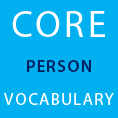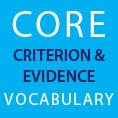Core Vocabularies
Core Vocabularies are simplified, re-usable and extensible data models that capture the fundamental characteristics of an entity in a context-neutral fashion. Public administrations can use and extend the Core Vocabularies in the following contexts:
• Development of new systems: the Core Vocabularies can be used as a default starting point for designing the conceptual and logical data models in newly developed information systems.
• Information exchange between systems: the Core Vocabularies can become the basis of a context-specific data model used to exchange data among existing information systems.
• Data integration: the Core Vocabularies can be used to integrate data that comes from disparate data sources and create a data mesh-up.
• Open data publishing: the Core Vocabularies can be used as the foundation of a common export format for data in base registries like cadastres, business registers and public service portals.
The Handbook for using the Core Vocabularies describes how the Core Vocabularies can be used by public administrations. It explains how to a) design new data models that extend the Core Vocabularies; and b) map existing data models to the Core Vocabularies. There is also a practical guide to using the Core Vocabularies, based on the handbook.
Vocabulary |
Description |
 |
The Core Business Vocabulary (latest version) is a simplified, reusable and extensible data model that captures the fundamental characteristics of a legal entity, e.g. the legal name, the activity, address, legal identifier, company type, and its activities. The RDF syntax of the Core Business Vocabulary has been formally published on the W3C standards track as a Public Working Draft. The RDF syntax binding of the Core Business Vocabulary has been named as Registered Organisation Vocabulary by W3C. |
 |
The Core Location Vocabulary (latest version) is a simplified, reusable and extensible data model that captures the fundamental characteristics of a location, represented as an address, a geographic name, or geometry. The Location Vocabulary is aligned with the INSPIRE data specifications. |
 |
The Core Person Vocabulary (latest version) is a simplified, reusable and extensible data model that captures the fundamental characteristics of a person, e.g. the name, the gender, the date of birth, etc. |
 |
The Core Public Organisation Vocabulary (latest version) is a simplified, reusable and extensible data model for describing public organisations in the European Union. |
 |
The Core Public Service Vocabulary (latest version) is a simplified, reusable and extensible data model that captures the fundamental characteristics of a service offered by public administration. Such characteristics include the title, description, inputs, outputs, providers, locations, etc. of the public service. An application profile of the Core Public Service Vocabulary (CPSV-AP) has been developed for describing public services and grouping them in business events. |
 |
The Core Evidence and Criterion Vocabulary (latest version) is a simplified, reusable and extensible data model for describing the principles and the means that a private entity must fulfil in order to become eligible or to be qualified to perform public services or participate in public procurement. Public entities often need to define the criteria. A Criterion is a rule or principle that is used to judge, evaluate or test something. An Evidence is the means by which a Criterion may be proven. |